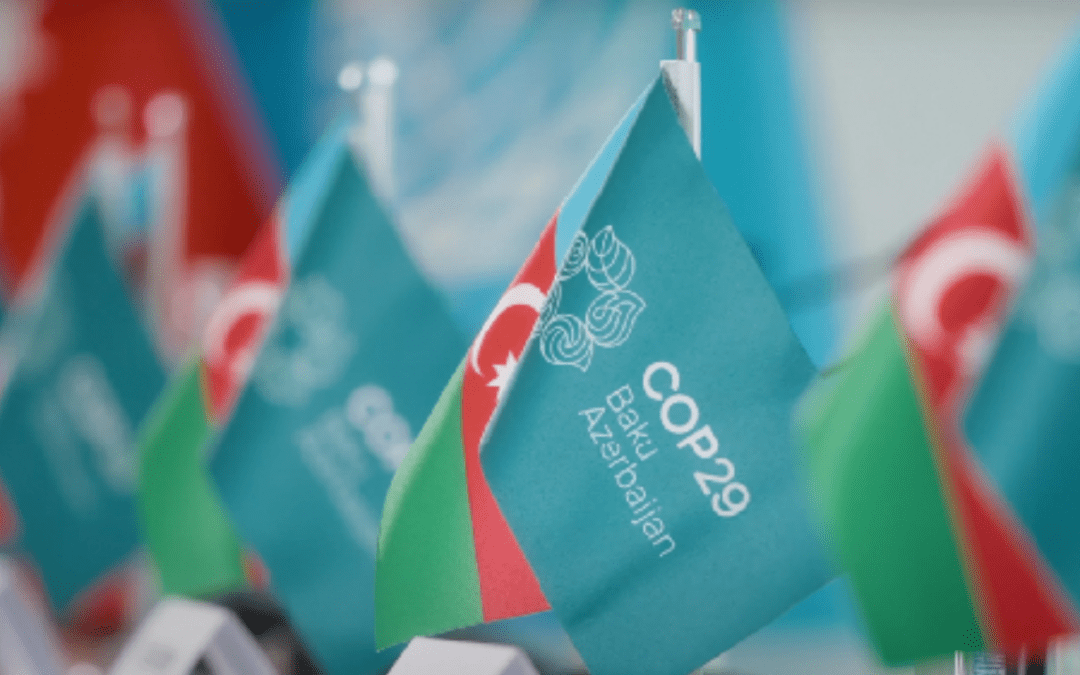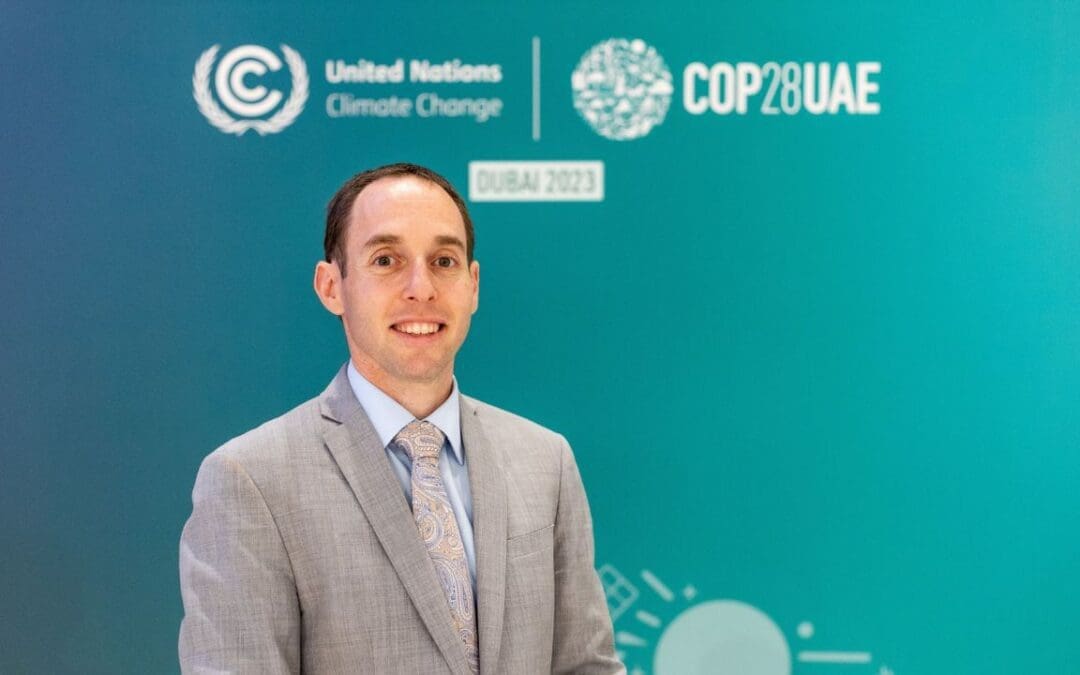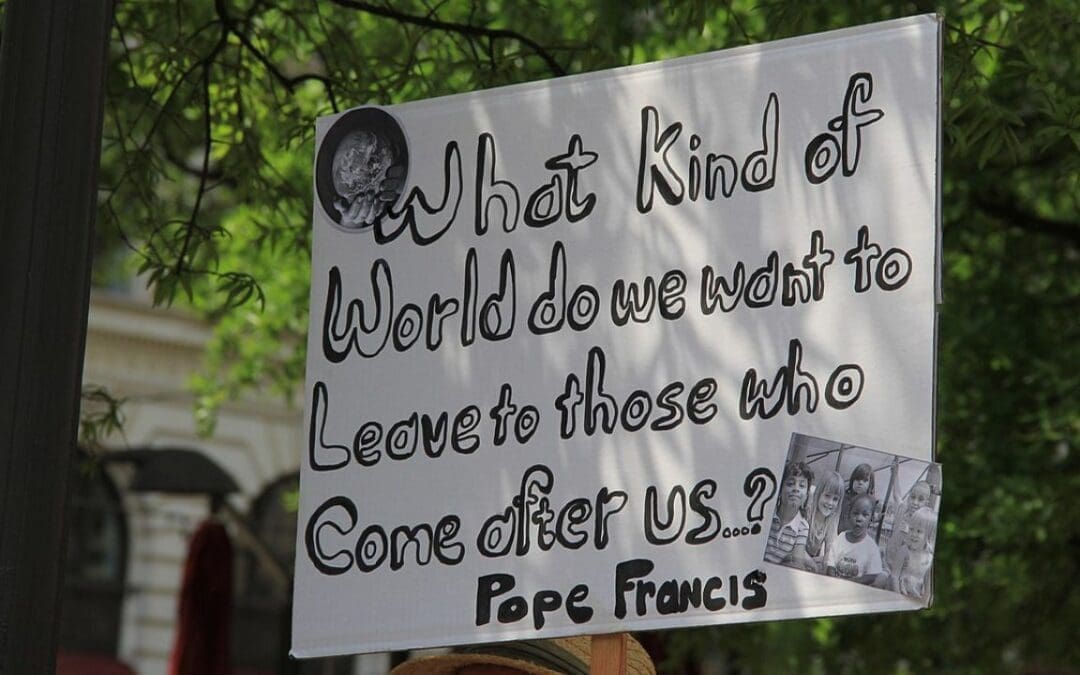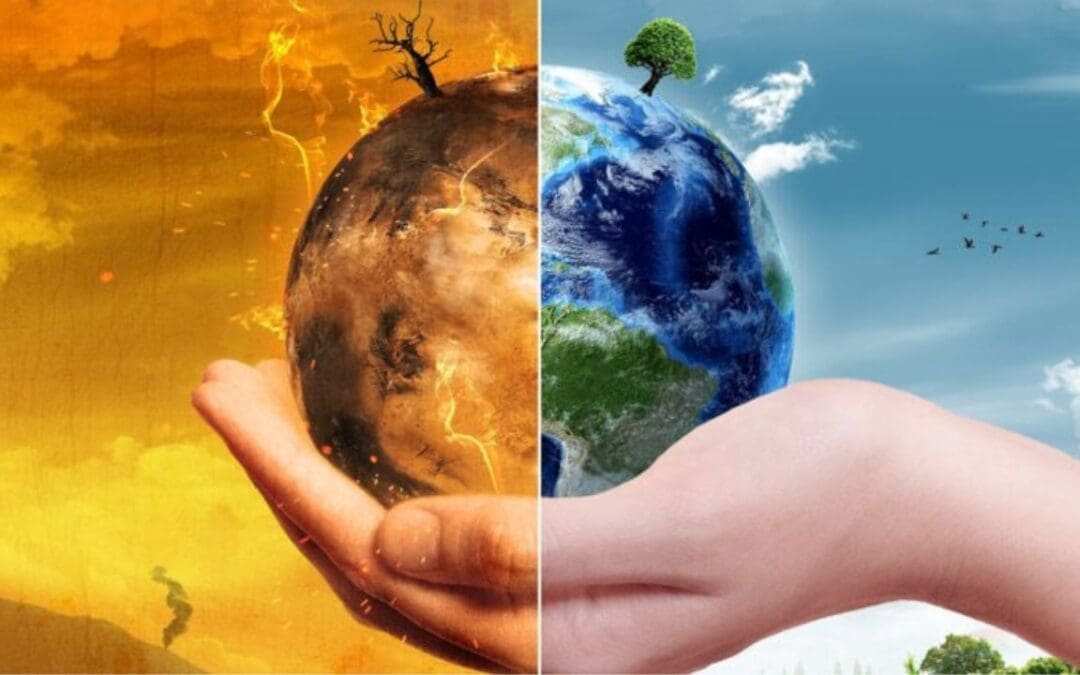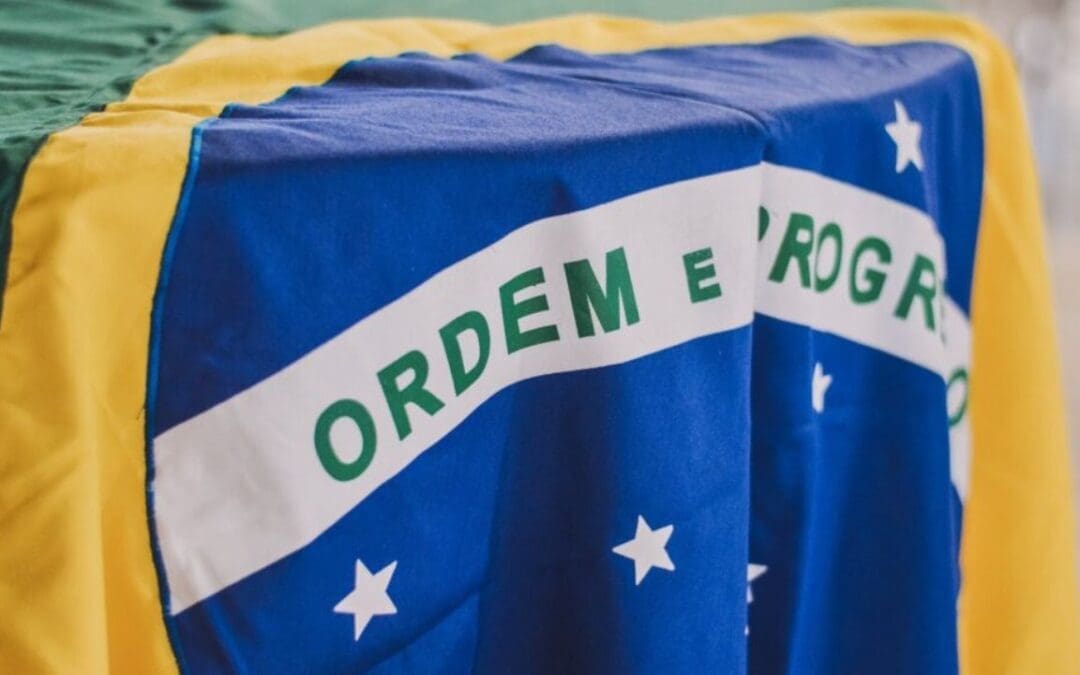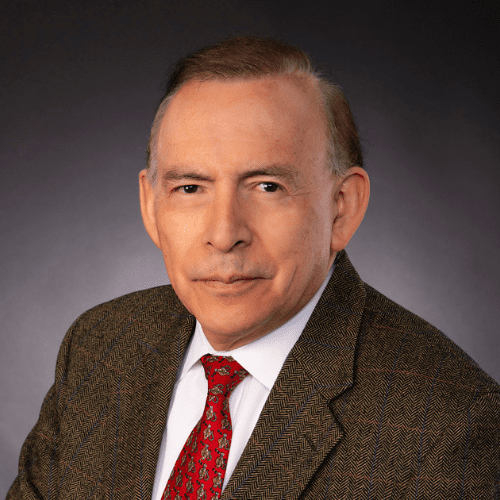
by Sovaida Maani Ewing | Dec 12, 2024 | Climate Justice
The ability to see and accept things as they are is difficult for us humans. We tend to repeat behaviors that fail to yield the results we want, lulling ourselves into the belief that this time the outcome will somehow be different. We mask our repeated endeavors as exercises in optimism even when we’re deeply mired in denial. Yet, accepting reality as it is, including acknowledging moments of failure, is a prerequisite for making meaningful change. One of the stark realities we must face as a global community is that the system we established in 1992 in the international treaty known as the United Nations Framework Convention on Climate Change (UNFCC) which resulted in regular meetings of the state parties known as COPs (conference of the parties) is simply inadequate to the task. This inadequacy applies in spades to the 21st COP which resulted in the 2015 Paris Climate Agreement that aimed to keep climate change from wreaking calamitous effects on our way of life and the environment. The system as crafted simply cannot deliver on its promises. More specifically, the goal of limiting the rise in global temperatures to 1.5 degrees Celsius above pre-industrial levels is already beyond our grasp and the goal of keeping such a rise to well below 2 degrees is a chimera. For those who may have had doubts about the severity of the threat of climate change, the bitter reality of the historically unprecedented rise in global temperatures in the form of unprecedented droughts, floods, sea-level rise, destructive storms, wildfires, and catastrophic loss of biodiversity, is already with us.
The current system is replete with fatal flaws that include the following: First, a reliance on voluntary pledges (or “nationally determined contributions” as they are termed in the Paris Agreement) representing efforts by each country to reduce national emissions and adapt to the impacts of climate change, simply does not work. Even if all the countries that signed on to the Paris Agreement were to fulfill the pledges they have given, current reports estimate that temperatures likely will still rise beyond the 2 degree Celsius outer limit we have set ourselves. As it stands, however, many countries are nowhere near fulfilling their pledges, putting us on the pathway to a rise in temperatures above pre-industrial levels ranging between 2.5 – 2.9 degrees Celsius by 2100. More importantly, there is no mechanism for holding nations to their promises. The system is therefore unfit for purpose and must be discarded in favor of an effective one.
Second, collective funding for activities like mitigation and adaptation and even research and development into alternative clean energy sources has proven challenging and generally unsuccessful, with poorer developing countries generally finding themselves supplicating, cap in hand, while richer countries respond by ducking and doing whatever it takes to limit their exposure.
Third, the rules governing the COPs require that all decisions be taken by consensus, effectively granting each member country the right to veto any agreement. The result is paralysis or at best agreement based on the lowest common denominator.
Given the degree to which the current COP system is flawed, it is time for us to find an alternative system to combat climate change that includes at its heart an effective pathway to reducing emissions. What humanity desperately needs at this stage in its collective development is a collective decision-making institution in the form of a World Legislature or World Parliament that is democratically elected by the people of the world and equipped with the authority to pass binding international laws in areas where global challenges like climate change demand global solutions. Such a global body should be able, for instance, to pass binding legislation requiring a scheduled universal phase-down of the quantities of fossil fuel that nations can burn. It should also be empowered to levy limited taxes on each member of the global community. Just as we pay state and national taxes, so too, we could be required to pay a modicum of international taxes to defray the costs of meeting our global needs and solving our global challenges. Moreover, decisions of the World Legislature should be based on a two-thirds or other majority vote, rather than requiring unanimity. Last, but by no means least, it should have an enforcement mechanism to ensure that nations comply with the laws it passes.
In sum, it is time to courageously and humbly acknowledge that our COP system does not work and to boldly reimagine a new system for stemming global warming. In this endeavor we would do well to heed the following words of Robert Schuman uttered in 1950: “World peace cannot be safeguarded without creative efforts commensurate with the dangers that threaten it.”

by Lawrence Wittner | Feb 20, 2024 | Climate Justice, Disarmament
For some time, it’s been apparent that the world’s nations are not meeting the growing challenges to human survival.
A key challenge comes from modern war.
Over the centuries, as military weapons have grown ever more destructive, war-related devastation has grown accordingly. World War II was the deadliest military conflict in human history, with an estimated 70-85 million people perishing from the war directly or through war-caused disease, famine, and other indirect factors. Most of the dead were civilians. In addition, many millions of people were wounded―blinded, crippled, driven mad, or otherwise ravaged by the vast carnage. Large portions of the globe had become a charnel house, with the battered survivors left to desperately scavenge for food amid the burnt-out rubble and ruin.
Although some scholars have pointed out that warfare has declined since then, and especially since the end of the Cold War, there was a sharp turnabout in 2022, when the wars in Ethiopia and Ukraine contributed to more battle-related deaths than in any year since 1994. By late 2023, Russia’s military invasion of Ukraine alone had produced an estimated 315,000 killed or injured Russian troops, while the number of casualties among Ukrainian troops and civilians, though unknown, is certainly enormous. Among these and the many other wars currently raging―in Sudan, Myanmar, Ethiopia, the Sahel, and Syria, to name only a few―the recent one in Gaza, with the fastest daily death rate of the 21st century, is particularly alarming, having already led to nearly 30,000 deaths and nearly 70,000 injuries.
And then, of course, there’s nuclear war, which emerged in 1945 with the utter annihilation of Hiroshima and Nagasaki, and which now has the capacity to end virtually all life on earth. Amid public threats from leaders of nuclear-armed nations to launch a nuclear war, the editors of the Bulletin of the Atomic Scientists have set their “Doomsday Clock” at its closest ever to apocalypse.
War―particularly nuclear war―is probably the fastest way to extinguish the human race, but there are other crises underway that, on a longer-range basis, seem likely to accomplish the same task.
The most serious of these crises is environmental. In recent decades, there has been a rapid loss of biodiversity, with the sixth mass extinction of wildlife clearly accelerating. Pollution has grown dramatically. This includes pollution of land and water caused by chemicals and by plastic (which takes 400 years to decompose) and of the air caused by industrial, motor vehicle, and other emissions (leading to an estimated 4.2 to 7 million human deaths annually). Damage to the soil, caused especially by use of toxic chemicals and other pollutants, as well as by deforestation, has become particularly severe. The United Nations has estimated that some 40 percent of the planet’s soil is now degraded.
A key element in the environmental collapse is the growing climate catastrophe, caused primarily by the burning of fossil fuels. Melting icecaps and rising sea levels, unprecedented hurricanes, floods, and wildfires, and ocean acidification are all well underway. Together with unsustainable farming practices, rising temperatures have produced growing food and water scarcity. UN Secretary General Antonio Guterres declared that, unless immediate action is taken, there will be a “global food emergency that could have long term impacts on hundreds of millions of adults and children.” Furthermore, it is estimated that, by 2025, two-thirds of the world’s people might face water shortages. Commenting on the deteriorating climate situation, Guterres declared gloomily in September 2023 that “humanity has opened the gates to hell.”
The rise of rightwing nationalism provides yet another challenge to human survival. In recent years, rightwing political movements―headed by authoritarian demagogues such as Donald Trump (United States), Jair Bolsonaro (Brazil), Vladimir Putin (Russia), Narendra Modi (India), Recep Tayyip Erdogan (Turkey), Marine Le Pen (France), Benjamin Netanyahu (Israel), Viktor Orban (Hungary), and their counterparts in other lands―have transformed the landscape of world politics. Appealing to xenophobia, militarism, racism, and religious prejudice, they have made great strides toward stirring up longstanding hatreds in their ruthless quest for power. A key to their success along these lines has been their call to revive the ostensible glory of their own nations by purging their internal enemies and triumphing over other, ostensibly inferior, countries abroad. Redolent of the fascist movements of the 1930s, this Radical Right approach portends worldwide turmoil, violence, and destruction.
Of course, it might not be too late to head off these developments. After all, in the twentieth century, humanity did manage to defeat the drive of the rightwing maniacs who established fascist regimes and launched vast wars to rule the world. In the aftermath of the chaos and destruction of World War II, humanity did manage to create the United Nations and to extend the range of international law. And, still later, as the planet stood on the brink of nuclear war, humanity did manage to roll back the nuclear menace and, for a time, halt the nuclear arms race and curb the prevalence of war.
Moreover, there are a great many efforts underway―by social movements and some far-sighted governments―to address the contemporary crises. Peace, environmental, and political action movements have flourished and brought forth demands for sweeping changes in public policy. In addition, some social movements, recognizing the global nature of the problems facing humanity, have called for enhanced global governance to cope with the severe threats posed by war, environmental devastation, and violations of human rights. The Summit of the Future on the horizon in September 2024 has been hailed as a “once in a generation” opportunity for meaningful reform of the global governance architecture. This watershed moment could be seized as a chance to correct course and avert disaster for humanity and the planet.
Even so, as the world once again veers toward destruction, it’s clear that it’s getting late―very late―to avert catastrophe.
Image Source: Doomsday Clock சஞ்சீவி சிவகுமார், CC BY-SA 4.0, via Wikimedia Commons

by Daniel Perell | Dec 30, 2023 | Climate Justice
My father was always the smartest person in the room. Despite never studying medicine, he once assisted a pre-med friend in preparing for an exam entirely by recalling intricate anatomical structures from a biology course he had taken thirty years prior.
My father was also a smoker. Some of my earliest memories are my tearful pleas to him to stop, knowing, as we both did, the risks. My dad did the math and determined that he didn’t yet need to change behavior. He would coin clever phrases like “maybe I might” and “I want to want to quit.” This reticence instilled in me, from a very young age, a curiosity about what truly motivates people to change. Is it data? We had that. Is it the cries of children? We had that, too.
As I awoke earlier this week to the news that agreement had been reached in Dubai, I, like many, chose to see hope in this small step. I will work tirelessly to contribute my small portion to this great collective effort to stave off the worst consequences of climate change. Yet a question remains in my mind—to what degree can these agreements bend the curve of our behavior? How can we ensure the trajectory will be meaningfully different with this consensus having been reached?
I look to examples the international community has created to shape the behavior of governments and humanity more broadly. The Security Council, the human rights system, the sustainable development goals. Each has had an impact in its own way. A stronger enforcement mechanism like the Security Council increases legitimacy, but limits consensus. A systematic and mandatory review system, like the Universal Periodic Review, ensures oversight and greater fact-finding, but is dependent on Member State compliance for results. And an entirely voluntary system, like the Sustainable Development Goals, can inspire the masses and allow the tracking of progress. Yet for the SDGs, and based on recent reports, the curve has yet to be bent sufficiently to achieve the prosperity a bright-eyed 2015 international community hoped for.
These are all helpful in their own right. But the forces of inertia are strong. Volition and motivation are needed.
Nowhere is this more relevant than in the case of climate agreements. Many nations which have contributed the least to climate change must respond to consequences not of their making. And those which exercise an outsized influence on the shape and direction of human affairs, for reasons of history and current priorities, are being asked to sacrifice a degree of short-term well-being of their economies for the long-term security of themselves and others. The science is clear; the issue is summoning the will to overcome the uncomfortable to achieve the necessary. In a way, these countries are my brilliant father.
When my dad was diagnosed with pancreatic cancer—the risk of which was increased by his smoking habit—he quit immediately. It was remarkable. But it was too late. He might have gotten cancer anyway, and it isn’t fair to place blame not knowing the alternate reality. But he certainly did not follow the rules of the precautionary principle in his behavior.
I am heartened to know that in communities around the world, action is being taken now to improve humanity’s relationship with the natural world. People are not waiting. Agreements like those reached in Dubai, in Paris, and elsewhere are important. They represent the consensus of governments, and we, as well-wishers of humanity and the planet, should encourage and expect ever higher ambition.
Yet regardless of our opinion of the outcome in 2023, we have a responsibility to continue looking for the stores of motivation and the diversity of options for individuals, institutions, and communities to make the necessary changes in light of the mounting evidence. If any lesson is to be taken from my family, it is that waiting is not a viable option.
This article was originally published in Bahá’í International Community’s blog.
Photo credit: Baha’i International Community

by David Oughton | Oct 28, 2023 | Climate Justice
Pope Francis released this apostolic exhortation “to all people of good will on the climate crisis” on October 4, the feast day of St. Francis of Assisi. Its Latin title refers to the message of St. Francis to “praise God for all of God’s creatures.” (#1) This letter to the world is an addendum to his 2015 encyclical “Laudato Si” (“Praise Be,” the beginning words of a canticle by St. Francis). That encyclical is known as “On Care for Our Common Home.”
Pope Francis decided to write Laudate Deum because “climate change is one of the principal challenges facing society and the global community” (#3) but he is gravely disappointed that “our responses have not been adequate.” (#2) The acceleration of global warming is evident now. “Despite all attempts to deny, conceal, gloss over or relativize the issue, the signs of climate change are here and increasingly evident.” (#5)
According to Pope Francis, “it is no longer possible to doubt the human–‘anthropic’–origin of climate change.” (#11) He says that it is a fact that the average global temperature has risen dramatically with the increase use of fossil fuels. The consequence is the melting of glaciers and the polar regions, the acidification of the oceans, and the rising of sea level. He concludes that “the change in average surface temperatures cannot be explained except as the result of the increase of greenhouse gases.” (#14) He believes that some effects of the climate crisis are already irreversible.
What has gotten us to this point? Pope Francis argues that a growing technocratic paradigm that exploits nature because of unbridled power and economic ambition is the underlying issue. Humans have forgotten that we are part of nature and that how we interact with the rest of nature affects our future. Therefore, “we need to rethink among other things the question of human power, its meaning and its limits.” (#28) We need to reassess an economic mentality about maximum gain at minimal cost because such an attitude has serious consequences about care of our common home and care for the poor and needy.
The 2015 Paris Agreement has ambitious goals that are not currently being met. Pope Francis hopes that the next climate conference will lead to the “necessary transition towards clean energy sources such as wind and solar energy, and the abandonment of fossil fuels.” (#55)
Pope Francis also addresses the weakness of international politics. Individual nations acting alone cannot solve the climate crisis or any of our other global problems. He says that we need multilateral agreements based on the principle of subsidiarity. Solving global problems requires “establishing global and effective rules” (#42) and “increased ‘democratization’ in the global context.” (#43)
The reason why humanity has been unable to solve major global problems is because of our current international system of sovereign nation-states. International law is a system of non-binding treaties. No nation is required to become a party to any international treaty. National governments that enter into treaties can withdraw from them or ignore them based on their perceived national interest.
In Laudato Si, Pope Francis agreed with several previous popes that “there is urgent need of a true world political authority.” (#175) Many Catholic leaders have been arguing that outlawing war and genocide as well as solving global problems such as climate change will require a truly effective democratic world public authority that can create and enforce world laws and prosecute individuals who violate them. Until such a system is created, Pope Francis says that it is imperative that national governments become parties to effective environmental treaties and that they keep their treaty obligations.
With this letter to the global community, Pope Francis continues his warning about the existential crisis caused by climate change. He emphasizes the physical and spiritual dimensions of this crisis. This letter needs to be studied by members of the world community because it concerns the future of our common home.
Image credit: Dcpeopleandeventsof2017, CC BY-SA 4.0, via Wikimedia Commons

by Citizens for Global Solutions | Feb 22, 2023 | Climate Justice
When it comes to the climate crisis, we are running out of time.
In 1994, the UN Framework Convention on Climate Change established the Conference of the Parties (COP) to encourage UN member states to meet annually to discuss scientific data and technological advances related to climate change and implement international environmental agreements. Despite the global interest in addressing climate change, the next 29 years would be characterized by lukewarm international efforts to divert a climate catastrophe. In line with this record, the recent COP27 hosted by Egypt failed to secure cooperation on key issues and induce the necessary commitments to reduce greenhouse gas emissions.
One of the earliest international environmental treaties was the Montreal Protocol of 1987. The Montreal Protocol was a success because all 197 UN member states ratified the treaty and it effectively coordinated international efforts to eradicate about 99 percent of ozone-depleting substances (ODS). One major reason behind its success was that it established a “Multilateral Fund” to provide financial backing to countries, especially those who were not meeting their goals. It also prioritized the concept of “common but differentiated responsibilities” by giving developing countries more time to eliminate their production of ODS.
The Kyoto Protocol, which entered into force in 2005, was the first “legally binding” climate treaty that aimed to reduce greenhouse gas emissions. However, it was not successful because the United States never ratified it and China was not required to commit to stringent emissions reduction targets. As this treaty required real economic sacrifices from industrialized countries, it was unable to effectively coordinate international efforts.
The most comprehensive environmental treaty to date was the Paris Agreement of 2015. The Paris Accords required all UN member states to commit to containing average global temperature increases to below 1.5°C above pre-industrial temperatures through setting nationally determined contributions (NDCs). However, this unenforceable agreement was vulnerable to the vicissitudes of domestic politics that led countries to renege on their climate commitments or abandon the treaty altogether, as the United States did under President Donald Trump. Consequently, most climate change experts say that countries’ emissions reduction plans are not sufficient and will not be executed quickly enough to contain temperature increases to 1.5°C.
What lies behind the failure of international climate treaties to secure meaningful action?
One factor is the disagreement between industrialized and developing nations over which should bear most of the burden for reducing greenhouse gas emissions. Wealthy countries like the United States and Britain have contributed the most to cumulative emissions by normalizing environmentally unsustainable overconsumption. Beginning with the Industrial Revolutions, emissions stemming from the manufacturing of goods in European countries, supplied with raw materials from their colonies in Africa, South America, and Asia, skyrocketed. Industrializing countries like China and formerly colonized nations like India argue that, given the economic wealth and technological advancements acquired by others through industrialization and colonization, the wealthiest countries are the best equipped financially and technologically to lead efforts to address the climate crisis. They insist that demands to cut back on their own emissions are unreasonable, given their minor role in causing the current crisis, and that reducing their emissions will temporarily stifle the economic growth that wealthier countries have enjoyed.
Furthermore, the lack of global institutions that enact, interpret, and enforce international environmental laws and treaties seriously hinders coordinated international action. This “global governance deficit” lies at the root of international environmental treaties’ inability to catalyze collective action and hold countries to their climate commitments. A world order based on absolute national sovereignty therefore sacrifices a sustainable world future at the altar of national sovereignty and national political considerations.
To address these challenges, the world urgently needs international legal action that goes beyond the nation-state status quo. The UN General Assembly could be reformed to pass legally binding and enforceable resolutions through a voting process that also takes into account factors like population. The General Assembly could then pass binding resolutions requiring industrialized and high emitting countries like the United States and China to spearhead emissions reduction efforts and establish ecocide law to make environmental destruction an international criminal act, prosecuted by the International Criminal Court. Building an enforcement mechanism into international environmental treaties would mitigate our current climate crisis.
Promoting meaningful international climate action may also require creating new global governance institutions, such as an International Court for the Environment. Experts have proposed a “Climate Club” that would establish a single international target carbon price and sanction noncompliant countries and countries that do not participate.
In today’s warming world, the stakes have never been higher. To prevent an irreversible chain reaction of climate catastrophe, we must marshal our scientific acumen, political will, and technological prowess on a global scale to contain global temperature rise. Doing so will require addressing the politics of climate change policy within and among countries and the current ineffective system of global environmental governance, including its unenforceable international treaties.
The path forward will not be easy, for it will require unprecedented grassroots mobilization and political courage. But the task isn’t impossible. The far-sighted individuals who gathered in San Francisco to create the United Nations knew the difficulties that awaited them, but never surrendered to pessimism, hopelessness, or cowardice. They appreciated that the survival of humankind largely depended on their determination to forge a new path forward for international governance. We must do the same now with respect to the climate crisis, embracing effective global environmental governance and cooperation. The survival of 8 billion humans and all other species on our beloved Earth hinges on our success.

by Nicola Vallinoto | Nov 7, 2022 | Climate Justice
On the last weekend of October 2022, Brazil elected a new president: Luiz Inácio Lula da Silva, who defeated Jair Bolsonaro in a closely-fought second-round vote. Lula secured 50.8 percent of the vote compared to Bolsonaro, who garnered 49.2 percent.
On the last weekend of October 2022, Brazil elected a new president: Luiz Inácio Lula da Silva, who defeated Jair Bolsonaro in a closely-fought second-round vote. Lula secured 50.8 percent of the vote compared to Bolsonaro, who garnered 49.2 percent .
The return to office for Lula, who led the country from 2003 to 2010, would mark an extraordinary political change from a nationalist government to a government better inclined towards international democracy.
“Today the only winner is the Brazilian people,” Lula da Silva told the crowds gathered at a Sao Paulo hotel. “This isn’t a victory of mine or the Workers’ Party, nor the parties that supported me in campaign. It’s the victory of a democratic movement that formed above political parties, personal interests and ideologies so that democracy came out victorious.”
We can say that in addition to the Brazilian people, the world has also gained victory from da Silva’s victory because the proposals of the new president concern us all. Indeed, point of views of Lula and Bolsonaro deeply differ on various issues. The two politicians diverging views on these issues are subsequently outlined.
On the Amazon and climate change
Speaking during the annual debate in the UN General Assembly on Sept. 24 2019, Mr. Bolsonaro, who negates climate change, stressed that “the Amazon is not now destroyed by the flames, as the media would like to believe.” Bolsonaro underlined that “It is a fallacy to say that the Amazon is the heritage of humankind, and a misconception, as confirmed by scientists, to say that our Amazonian forests are the lungs of world. Using these fallacies, certain countries instead of helping, embarked on the media lies and behaved in a disrespectful manner and with a colonialist spirit. They even called into question that which we hold as the most sacred value: our own sovereignty.”(1) He also thanked Donald Trump who shares his approach to national sovereignty.
But reality says than since Bolsonaro took office since January 2019, deforestation has almost doubled compared to the previous year. During 2020 and 2021, Brazil’s greenhouse gas emissions increased by 9.5%. Of all emissions, 46% were due to deforestation, mainly driven by illegal mining and livestock expansion.
Preliminary reports indicate that in 2022, deforestation will reach record levels in the Amazon region. Izabella Teixeira, Brazil’s former environment minister from 2010 to 2016, promised to update the country’s nationally determined contribution (NDC) to the Paris Agreement, which outlines its plans to cut emissions. Brazil proposed its first NDC in September 2015 and has since updated it twice, the first time being in 2020 and the second in 2022. In both updates, made under Bolsonaro’s term as president, the country used accounting tricks to weaken its climate goals.
Conversely, according to Teixeira, Lula’s priority is to curb deforestation, the country’s main source of emissions, which has surged to a decade high under Bolsonaro (2).
In an article published by Le Monde (3) Lula da Silva affirmed that “today, the climate emergency, rising inequality and geopolitical tensions reveal the seriousness of the crisis affecting our planet. Unfortunately, Jair Bolsonaro has continued to make this situation worse by practicing climate revisionism, undermining the institutions of our democracy and promoting intolerance. Brazil, under my presidency, will again benefit from public policies aimed at improving the lives of our people and inspiring strong initiatives in favor of the protection of the environment, in particular the Amazon, and the fight against poverty in the world.”
On a Multipolar world
Lula da Silva explained his view on international affairs in the Tribune of Le Monde asserting that: “my goal now is to do more and better. For this, it is necessary for Brazil to be present at major international debates. We will develop a sovereign and active foreign policy. We will work for peace, dialogue and international cooperation. We believe in a multipolar world, and unlike some members of the Bolsonaro government, we do not believe that the Earth is flat and that the climate change does not exist. My Government will work with other countries to rebuild the Amazon Fund and thus take care of the Amazon rainforest and biodiversity.
In Latin America, we will strengthen Mercosur [Argentina, Brazil, Paraguay, Uruguay] and relaunch regional integration. We no longer want Latin America to limit itself to the sole export of raw materials. In this sense, we will work so that our countries can once again industrialize and technologically progress.
Faced with the growing rivalries between China and the United States, we want to dialogue with everyone, and build a strategic partnership with the European Union (EU). Improving the terms of the agreement Mercosur-EU will allow us to increase our trade, deepen our bonds of trust and strengthen the defense of our common values.
On the other hand, the priority of my government will be to restore the relationship with the African continent. Brasil will be present to help and expand political, economic and social cooperation with its countries. We believe – and, in winning, we will work – for a multipolar world united around values such as solidarity, cooperation, humanism and social justice. Faced with the challenges of civilizations that we live, we believe in a new global governance that must begin with the expansion of the UN Security Council and the establishment of new forms of cooperation between countries. We believe that another Brazil is possible, and that another world is possible because, in a past not so far away, we had started building it.”
In 2020, Lula published(4) a call “For a Multipolar World.” The call’s goal is “the creation of a multipolar world, free from unilateral hegemony and from sterile bipolar confrontation,” that “would permit a true re-founding of the multilateral order, based on principles of real multilateralism, in which international cooperation can truly flourish.” The call continues affirming that: “There seems to be an almost universal consensus that the world system will have to be rebuilt in a very fundamental way. It is not impossible, indeed it is imperative, that a certain number of states or supranational entities — such as a reborn European Union and the institutions dedicated to the integration of developing countries in Latin America, Africa and Asia (which will have to be reinforced or recreated) — shall look for alliances and partnerships, in a way that contributes to the creation of a multipolar world, free from unilateral hegemony and from sterile bipolar confrontation.”
On Latin American integration and Sur
In a speech at a rally on May 2nd 2022 Lula said, “We are going to create a currency in Latin America, because we can’t keep depending on the dollar”. He revealed that the currency would be called the Sur, which means “South” in Spanish. Lula explained that countries in Latin America could still keep their sovereign domestic currency, but they could use the Sur to do bilateral trade with each other, instead of having to exchange for US dollars. The Sur could also help to contain inflation in the region, Lula argued. He said the goal of the currency would be to deepen Latin American integration and strengthen the region’s economic sovereignty, weakening its dependence on the United States. Under Brazil’s current government, led by far-right leader Jair Bolsonaro, the South American giant has subordinated itself to Washington(5).
On the UN Security Council
Concerning global governance, Lula da Silva defends a new world governance, which would include the enlargement of the UN Security Council, and the creation of new institutions that “act differently from the IMF.” At a press conference with foreign media in Sao Paulo on August 22nd, Lula said that more countries need to become permanent members of the U.N. Security Council, so that the United Nations can better deal with Russia’s invasion of Ukraine, and growing tensions between China and Taiwan. Noting that the geopolitical landscape is changing, Lula said that the Security Council needs more and more nations and that the right to veto, held by its current five permanent members must be abolished. He asked why Brazil and countries such as Mexico, Egypt, Germany, South Africa and Japan cannot become permanent members, calling for Security Council reform based on geopolitics of the 21st century (6).
Contrary to what Lula said about the UN reform, the enlargement of the Security Council should follow a different and more representative composition. The federalists think that a regional representation (European Union, African Union, Mercosur, etc.) is more inclusive than a national one as proposed by new Brazilian President. Instead the proposal to abolish the anachronistic veto right of the five permanent members of Security Council is fully shareable. Even still, da Silva’s proposals point us in the right direction towards much needed reform in the international global governance system, and the hope here is that this will build some momentum and discourse around this issue.
The Lula da Silva’s victory in Brazil’s recent presidential election could represent a new start for international democracy. Let’s continue to watch the new government’s first steps on foreign policy, and see whether Lula’s electoral commitments will become reality.
https://news.un.org/en/story/2019/09/1047192
https://www.climatechangenews.com/2022/10/07/lula-campaign-update-brazil-climate-plan-ndc-new/
https://www.lemonde.fr/en/opinion/article/2022/10/29/luiz-inacio-lula-da-silva-another-brazil-is-possible_6002211_23.html
https://progressive.international/blueprint/8c4c685c-7ac6-4bbb-8b0b-5fc91fcc68f0-lula-da-silva-celso-amorim-for-a-multipolar-world/en
https://multipolarista.com/2022/05/04/brazil-lula-latin-america-currency-us-dollar/
https://www.nippon.com/en/news/yjj2022082300559/
This article originally appeared here: https://www.wfm-igp.org/federalist-paper/lulas-victory-in-brazils-presidential-election-a-potential-new-start-for-international-democracy-and-climate-change/
